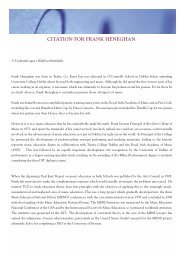TWICE THE SIZE - DIT Update - Dublin Institute of Technology
TWICE THE SIZE - DIT Update - Dublin Institute of Technology
TWICE THE SIZE - DIT Update - Dublin Institute of Technology
You also want an ePaper? Increase the reach of your titles
YUMPU automatically turns print PDFs into web optimized ePapers that Google loves.
like. The needs <strong>of</strong> safety, security and defence are different. Yet powerful<br />
institutional barriers to fundamental change remain. The challenge is to alter radically<br />
how we organise to defend and to fight.<br />
Economics are complex. When viewed in out-<strong>of</strong>-equilibrium formation, economic<br />
patterns are all too <strong>of</strong>ten simplified into the facile equilibrium <strong>of</strong> standard economic<br />
models. In reality, economics are ever-changing, showing perpetually novel behaviour<br />
and emergent phenomena. The challenge is to portray the economy not as<br />
deterministic, predictable and mechanistic; but as complex, process-dependent,<br />
organic and continually evolving.<br />
Détente with dilemma. Well-schooled in solving problems, governance at all scales<br />
needs to re-educate itself in the art <strong>of</strong> acting intelligently, and also compassionately, in<br />
situations that have no solution. Agencies and organisations <strong>of</strong> all kinds will have to find<br />
tools and processes for teasing-out the first-, second-, and third-order dilemmas in<br />
these situations. They will also have to reconcile multiple stakeholders and design<br />
processes that generate new values out <strong>of</strong> apparent conflicts <strong>of</strong> interest. The challenge<br />
is to reach some kind <strong>of</strong> détente with dilemma in a world with no externalities.<br />
Running the show. There will be a redistribution and relayering <strong>of</strong> power and<br />
governance at all scales and across all sectors <strong>of</strong> society. Representative government is<br />
fine in theory, but frequently fails in practice. Why? Three reasons are suggested. First,<br />
populations tend to elect the average. Second, elected representatives tend to be<br />
members <strong>of</strong> short-sighted, self-serving political parties. And third, large numbers <strong>of</strong><br />
people in the’ democracies’ feel alienated from the political process. The challenge is<br />
to promote more effective leadership, bring about a step change in the degree <strong>of</strong><br />
collaboration between key players in a process, and foster a deeper engagement<br />
between local people and large organisations.<br />
There will be surprises. Wildcards or jokers will be played from time-to-time. Some<br />
<strong>of</strong> these might be totally unexpected – some could be unlikely yet predictable. Leaders<br />
in organisations at all levels, and in all situations, need to collect the information, study<br />
the signs and confront the issues surrounding the degree <strong>of</strong> probability and scale <strong>of</strong><br />
impact <strong>of</strong> macro-uncertainties that might impinge upon their areas <strong>of</strong> responsibility.<br />
The challenge is to avoid tragedy by both anticipating and preparing to mitigate<br />
damage done by ‘predictable surprises’.<br />
Perhaps the main difference that distinguishes the 21 st Century from those that proceeded it is<br />
the need to develop a mindset that can tackle the conscious design <strong>of</strong> large systems – cities,<br />
communities, corporations, countries, cultures, domains and the earth itself.<br />
69








